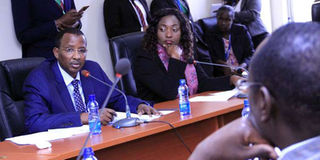IEBC proposes number of polling stations be increased

Ahmed Issack Hassan (left), the chairman of the Independent Electoral and Boundaries Commission and its vice-chairperson Lilian Mahiri-Zaja (next to him) before Senate's Public Accounts and Investments Committee at Parliament Buildings in Nairobi on September 26, 2016. PHOTO | DIANA NGILA | NATION MEDIA GROUP
What you need to know:
- Independent Electoral and Boundaries Commission (IEBC) has proposed changes because of Elections (Amendment) Act and Election Offences Act.
- It has presented them to National Assembly’s Justice and Legal Affairs Committee.
The number of polling stations in the next elections will increase to 57,331, pushing the total cost of the 2017 polls to Sh10.7 billion, the electoral commission has said.
The Independent Electoral and Boundaries Commission (IEBC) also wants political parties to nominate their candidates for respective elective seats between May 26 and June 9 — 60 days to the elections date.
These are among a raft of changes to the General Election timelines and logistics that the IEBC has proposed to comply with the new Elections (Amendment) Act and the Election Offences Act, 2016. The proposals were presented by the commission before the National Assembly’s Justice and Legal Affairs Committee.
The Nation has obtained a document from the committee headed by Ainabkoi MP Samwel Chepkong’a, which among other recommendations, wants Parliament to fix education qualifications of senators, MPs and members of county assemblies, which were left out during the amendment of the Elections Act.
The document shows that IEBC had initially planned to increase the number of polling stations from 33,000 in the last elections to 44,000 in the 2017 polls. However, the amended law fixes the number of voters per polling station at not more than 500, prompting the increase.
“While the commission planned with 44,000 polling stations, the capping of 500 voters per polling station has the effect of increasing the number of polling stations to 57,331. This is a 30 per cent increase in the number of polling stations. The total additional budgetary requirement is projected to be Sh10.767,” the document showed.
GENERAL ELECTION
The Sh10.767 billion comprises Sh7.058 billion for the General Election, Sh3.142 billion for voter register inspection and Sh296 million in legal and compliance costs.
The proposal assumes that the commission will register 22 million voters, even though the last mass voter registration netted 1.2 million voters while another 200,000 voters registered through the continuous process. A total of 14 million voters was registered in the 2013 elections.
“Our target was to get an additional eight million voters before the 2017 General Election. As of June 30, 2016, the commission had registered approximately 1.4 million voters as a result of continuous voter registration and mass voter registration campaign,” said the documents signed by IEBC chief executive officer Ezra Chiloba.
The commission revealed that the new law — the result of recommendations of the Joint Parliamentary Select Committee on electoral reforms — and which called for an audit of the current voters register forced to postpone another round of voter listing which was planned for last month. It is now planning for another round of voter registration after it has bought biometric voter registration devices by early December and completing the voter register audit by January 3.
“The commission has had to suspend the earlier planned inspection of the register of voters until the audit is completed. In the meantime, the commission will commence the preparations for the second phase of mass voter registration campaign,” said the document.
‘ALL STATIONS’
“Unlike before, verification must now happen at all polling stations. In 2013, verification was conducted in 24,000 registration centres over a period of 14 days.
With the new law, the commission will conduct verification in each of the 57,331 polling stations,”
“Since the sequencing of the processes highlight potential overlaps, it is important for political parties to be encouraged to start their processes much earlier than set out in the law. In some cases, the commission may invoke its powers to extend some of these timelines,” it states.
The strict timelines, however do not provide a window for political parties to sort out disputes emerging from the nominations.
“As a result of timelines provided for in the new law, the process of resolving disputes arising from both party primaries and nominations is not factored,” the document observes.
The IEBC argues that the new law failed to take on board the need to fix the education qualifications of MPs and MCAs, which had been contained in the Elections Laws (Amendment) Bill which was crafted by the committee, and urged the team to proceed with processing the amendment on academic qualifications.





